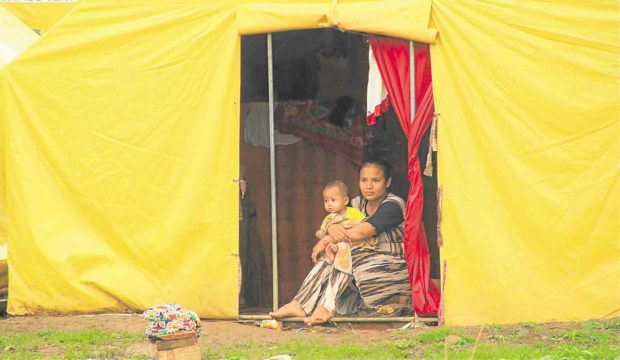Long way home for Marawi evacuees

A mother and her child, who were displaced by the five-month fighting in Marawi City, take shelter in a tent at an evacuation camp in Balo-i town, Lanao del Norte province, as they wait for the rain to stop. —BARRY OHAYLAN
BALO-I, LANAO DEL NORTE —Cradling her baby in a muddy tent camp, Jamalia Pindaton has no idea if she can return home to Marawi City after the end of a five-month war launched by Islamic State supporters.
More than 350,000 people from in and around Marawi, the mainly Catholic Philippines’ Islamic capital, were displaced because of the conflict, which ended on Monday when soldiers killed the remaining gunmen.
But with the eastern half of Marawi almost destroyed and worries over bombs planted by the militants, authorities have said it could be months, or even years, before most people would be able to return.
“We don’t know if our house is still there,” Pindaton, 29, told Agence France-Presse (AFP) on Thursday as she held her 6-month-old daughter at an evacuation center in a coconut grove at Balo-i, 20 kilometers from Marawi. “It is difficult here. We don’t have income and can only rely on relief.”
About 10,000 Marawi residents have been allowed to return so far, mostly those who lived near the Mindanao State University that was well outside the battle zone, according to local authorities.
Article continues after this advertisementAbout 33,000 others, whose homes are in so-called “controlled areas” that were spared the worst of the war, are set to follow next week, regional social welfare chief Zorahayda Taha told AFP.
Article continues after this advertisementMany of the displaced are living with relatives and friends, but tens of thousands without such support networks like Pindaton have been forced to live in makeshift evacuation centers.
Signaling how long it will take to rebuild Marawi, the government is building new low-cost housing for this group.
It has also launched cash-for-work schemes and given families a P200 daily cash allowance to help them out with groceries.
Pindaton’s husband, a former construction worker, has been planting corn on government land in one of the cash-for-work schemes. But she said he would only be paid when the corn went to market, leaving them totally reliant on handouts.
The Philippines has a long experience of managing large, seasonally displaced populations due to frequent natural disasters such as typhoons, floods and earthquakes, and the government has sought to quickly start a rehabilitation program for Marawi.
Rebuilding
Aside from claiming the lives of 920 militants, 165 troops and 47 civilians, according to government records, thousands of buildings were destroyed with entire districts turned into piles of concrete rubble.
Rebuilding Marawi’s basic infrastructure alone, including power, tap water and roads, will cost $1.1 billion, according to Defense Secretary Delfin Lorenzana.
The International Committee of the Red Cross (ICRC), which has been helping the displaced, expects between 30,000 and 40,000 of the “most vulnerable” residents to require food, shelter, livelihood and housing assistance for up to several years.
“It’s something very unusual that we unfortunately see in other parts of the world, like in the Middle East or even in Africa,” Roberto Petronio, ICRC’s southern Philippines chief, told AFP.
Even for those who have managed to return home in recent days, widespread looting and the general devastation in the city have quickly doused their sense of relief.
Another key concern is the disruption of children’s education.—AFP